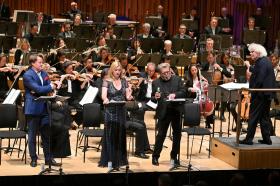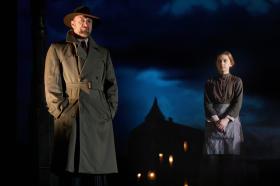Richard Attenborough in 2008. Image via www.answers.com
Best known as the Oscar-winning director of Gandhi, and more recently for appearing in the Jurassic Park films – a role that introduced him to a whole new generation of movie-goers – Richard Attenborough died in an English nursing home on Sunday. He was aged 90, and been confined to a wheelchair since injuring himself in a fall in 2008.
Attenborough was born in Cambridge on 29 August 1923, the eldest of three boys born to his parents Mary and Frederick, and was exposed to the arts from an early age.
He was also schooled in the importance of social responsibility from an early age, with his parents protesting the Spanish Civil War, and later taking two young Jewish girls into their home during the Second World War. ‘That particular decision, not merely paying lip service but taking positive, responsible action to help other human beings, made a profound impression on me. It has, I suppose, affected my life and my attitudes ever since,’ Attenborough would later write.
He was educated at a Leicester grammar school and won a scholarship to the Royal Academy of Dramatic Art (RADA) in 1940. Shortly before enlisting in the Royal Air Force (RAF) Attenborough appeared to great acclaim in a stage production of Brighton Rock, playing the villainous Pinkie Brown; a role he would later recreate on screen in 1947.
In 1945, while serving in the RAF Film Unit following his pilot training, he married actress Sheila Sim.
His screen career continued after the war, often playing young working class men and boys in films such as The Man Within (1947), The Guinea Pig (1948) and Boys in Brown (1949), and he also continued to appear on stage, most notably in the long-running production The Mousetrap, in which Attenborough created the role of Detective Sergeant Trotter when the production opened in 1952.
After more screen roles in the ’50s, Attenborough moved into producing in the 1960s, founding Beaver Films with actor/director Bryan Forbes, and also an independent distribution company, Allied Film Makers. During this decade he also began working in Hollywood, most famously appearing in The Great Escape (1963) opposite James Garner and Steve McQueen, using the money from such films to bankroll the development of his pet project, the feature film Gandhi, which would take him 18 years to make.
After its completion, Gandhi went on to win eight Academy Awards, including Best Picture and Best Director, as well as the BAFTAs for Best Film and Best Direction. It also holds the Guinness World Record for the most extras appearing on screen – over 300,000 people appear in the film’s funeral scene.
Attenborough went on to become the Chairman of Channel 4 and the British Film Institute in the 1980s. He continued to direct, making films such as Cry Freedom (1987), Chaplin (1992) and Grey Owl (1999), and returned to acting after a 13-year break in 1993, playing the billionaire John Hammond in Steven Spielberg’s Jurassic Park (1993).
He was also a passionate supporter of numerous social causes, and was made a peer of the realm in 1993, having previously been knighted in 1976.
Tributes to Attenborough have flowed in across traditional and social media.
Britain’s Prime Minister David Cameron tweeted: ‘His acting in “Brighton Rock” was brilliant, his directing of “Gandhi” was stunning – Richard Attenborough was one of the greats of cinema.’
The British Labour Party paid tribute to Attenborough in a statement, saying: ‘Lord Attenborough made an enormous contribution to our country and to the film industry both as an actor and a director. His films will be loved for generations to come. He believed passionately in social justice and the Labour Party and was a vocal campaigner against apartheid. He will be sadly missed. Our thoughts are with his family and friends.’
Sir Ben Kingsley, who played the title role in Gandhi, said: ‘Richard Attenborough trusted me with the crucial and central task of bringing to life a dream it took him 20 years to bring to fruition.
‘When he gave me the part of Gandhi it was with great grace and joy. He placed in me an absolute trust and in turn I placed an absolute trust in him and grew to love him.’
Attenborough’s kindness and generosity were acknowledged by journalist David Gritten in The Telegraph, who wrote: ‘Always engaging and friendly, he seemed equally at ease with heads of state and the lowliest members of his film crews. He had nicknames for almost everyone who walked on to his sets … and he courteously addressed individual extras as “Sir” or “Madam” – more respect than they’d expect from a film-maker.’
Film critic for The Guardian Peter Bradshaw said Attenborough’s death was ‘a sad day for the British film industry,’ while producer David Puttnam said: ‘This highly erudite man epitomised everything that was special about his generation of artists, one which cared deeply – treasuring, celebrating and recording all that was best in people.’
Attenborough is survived by his wife Sheila, and their children Michael and Charlotte.





